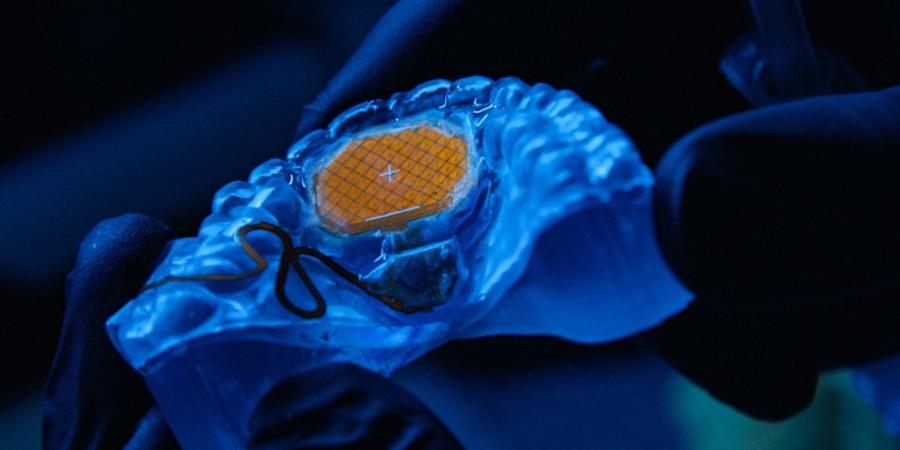Worldwide, about one in six people live with a disability. Whether through injury or illness, disability can manifest itself as an impediment to mobility. There have been fantastic advancements in communication and operational technologies, but there’s always room for improvement, and Augmental, an MIT Media Lab spinoff, thinks that it might be on to something with its newly announced MouthPad.
When you think of assistive devices, you might think of eye-tracking technology, mouth-controlled joysticks or voice recognition assistance. However, as Tomás Vega, one of Augmental’s co-founders, pointed out, many of these devices rely on old tech and — in the case of mouth-controlled joysticks — are obtrusive. They can be exhausting to use, don’t necessarily pay much heed to privacy and they can have other negative impacts, for example, on teeth.
“Augmental has a goal to create an interface that overcomes all those limitations,” says Vega. “Making one that is expressive, and private and seamless and slick. We created a mouth pad which is an internal interface that allows you to control a computer with no hands.”
The Augmental team regards MouthPad’s development as part of the normal progression of technology.
Tongue-controlled gaming is one of the angles Augmental takes into this market. Image Credits: Augmental
Tongue-controlled gaming is one of the angles Augmental takes into this market. Image Credits: Augmental
“But we can kind of give ourselves the context of just looking at the history of this,” said Corten Singer, co-founder of Augmental. “Mainframe rooms once existed, where the whole room was the computer plugging in actual cables, go to your desktop, or laptops are now with us. Our phones are in our pockets at all times. We have wristwatches that are smart; we’ve got buds in our ears. It’s kind of speaking towards this more seamless human machine integration that is coming in.”
The MouthPad is similar to a dental retainer or plate, but rather than realigning your teeth or holding false ones in place, it provides the opportunity for a wearer to control Bluetooth-connected devices using their tongue. Each MouthPad is created individually using dental scans to ensure that it fits its user perfectly.
“With our super customizable design — the fact that we’re using dental scans — it allows us to be a perfect fit to the user’s anatomy,” said Singer. “We can design a very thin low-profile device that reduces or at least minimizes the impact you have on speech, because in reality, speech interfaces are helpful.”
“Yes, they’re not private, but they’re pretty awesome,” said Singer of speech interfaces. “And we want to design to be complementary with that. Of course we want also to be able to serve as a standalone option, but we don’t want to remove the ability to use the speech interfaces but meet the technology as it currently exists in the landscape, where it’s at and not necessarily interrupting them.”
Singer described how Augmental’s MouthPad enables eight degrees of freedom to control it. The tongue can operate through the X and Y axes, as well as by deploying pressure. There’re motion sensors that can detect head tracking and activity monitoring. And there’s even a possibility for bites to register as a click.
The wide variety of control options embedded into the MouthPad means that it can be used in conjunction with many different devices. When TechCrunch spoke to the Augmental team, they gave examples from their test users as to how people are making the most of the MouthPad.
“We have gamers that have quadriplegia, and they can only use a joystick,” said Vega. “So in order to play, you need two joysticks, so we were complementing a setup, so they can know strafe and aim at the same time.”
“Then we have another user who is a designer that has issues doing click and drag in very accurate ways,” said Vega. “So we’ve created a clutching gesture so he can click in and click out.”
But as well as being used for gaming and for work, the MouthPad has also been connected to a sex toy to enable someone with a spinal cord injury to engage in autonomous sex play. Singer explained how some people have been surprised by this use case, but that really, it shouldn’t be regarded as peculiar or extraordinary: it’s a function that helps to make people’s lives better.
“It’s just part of this conversation that we think should be had, you know,” said Singer. “It’s at the core, it’s a theme of universal accessibility and digital equity across the board.”
So far, the Augmental team has raised pre-seed funding from investors at MIT and Berkeley. It has recently launched its website where it has opened up a waitlist, enabling people to sign up for a MouthPad. There is still a little delay, however.
“We still need to finish our FCC certification before we can ship and sell devices,” said Singer, “putting them into the mouths of our customers.”
The company put together a video demo, in case you want to take a closer lick:
Source @TechCrunch



